
On Pucas and Irish Folklore - Authors note
Pucas are fey beings of Gaelic origin, according to folklore they can be either good or bad. The good ones bring wealth and prosperity, the bad misfortune and woe. They range in appearance, being shapeshifters they can alter their appearance at will. However they are commonly known to take the form of diminutive creatures, short with shoes made of leaves and the like.
Lugh was playing the part of a Puca, even pretending to be one. But the being known as Puca Bel Lugh is no Puca, after all a Puca does not need to have the kind of offerings that Lugh does for their services. Indeed, giving them a gift is more likely to cause them to leave, not act gleeful and chipper.
So what is Lugh? After all, considering what he does shouldn’t the princesses notice or sense him?
Well if you replace the Puca in his name with another word it might make more sense. Perhaps the word
Or you could just look up Bel and Lugh, both are Gaelic deities. One was associated with horses and possibly other creatures. As well as the festival sabbath Beltane. I changed the name a bit on purpose, but it’s the same time. P.B Lugh is a combination of sorts of both Bel and Lugh, though darker in nature than both. It’s implied in the story things in the otherworld have changed, perhaps that is part of why the two combined into one?
Celestia and Luna can’t find Lugh because he too has sway over the sun, as well as horses and ponies. Though he can’t move it like the princesses, he can use its power to hide himself. It’s why during the daytime he seems, and indeed looks, different. Lugh can hide himself from the might of Celestia, by using the sun itself to power his tricks and powers. He also evades Luna because he does not sleep or dream, and being an old fey god is more attuned to the darkness. It helps he goes to The Otherworld after he grabs his daily offering. The place exists outside Equestria and between the boundaries of the dimension of MLP and others. Celestia and Luna simply can’t find him or those he takes there.
The daily offerings are part of the price Cranky agreed to pay. The part he could not read due to dialect issues. He was not tricked into signing the contract, for Lugh himself can’t appear before someone unless they truly desire something. For Cranky this desire displayed in his passion for his lawn, his desire for it to be perfect. Though the truth is he wanted more, much more. This is why Lugh appeared before him on the last day of Spring Beltane, and not some lesser entity. The depths of his desire, the amount sheer amount of things, as well as his dutiful care for the lawn and his wife are what brought Lugh to him.
In the last chapter when he said that he chose to offer Cranky the choices concerning ending contract because he earned it by “pouring his blood, sweat, tears, and very soul into the dirt and soil,” he wasn’t lying. Cranky and his devotion to his yard caused him to do just that by sheer force of will. It was the equivalent of a sacrifice to the patron deity of the harvest, fields, and home. In other words, Cranky called Lugh and his attention to Equestria himself.
The reason the offerings are daily is due to Beltane having ended, Lugh needs offerings to remain in the world of Equis and fulfill the contract. All those missing ponies as you may have guessed, were taken by him as offerings that allowed him to remain. Those offerings were given to the earth and soil within his temporary domain (Cranky’s property), and crossed slowly to the otherworld instead of him.
The real turning point for the contract, and what determined Cranky’s fate, was when he told Lugh he considered him a friend. On and off scene Lugh asked him about it multiple times, asked if he was sure he wanted him as a friend. Cranky always said yes in a way. That is what led to the change of the two old donkeys into more youthful ones. The fruit that rejuvenates body, soul, at the cost of being insatiably hungry for a certain thing for a few hours? It’s a fruit of the otherworld, similar to the legendary ambrosia of the Greek Gods. Eating it and performing the ritual of life and bounty (sex, seriously the fruit makes you horny), will reverse your age and make you closer to those of the Otherworld.
It was a gift from Lugh, who by September had decided that he wanted Cranky to become kin to him; and with him Matilda as well. The contract Cranky had signed had a clause in relation to how it ended for the contractee, as indicated by the finale part one that ending wasn’t exactly pleasant. Lugh is a god, but he had grown fond of Cranky in a way he rarely has before. Cranky had managed to last till Beltane without breaking the contract, and he had given multiple gifts and offerings. Lugh really did see him as a friend of sorts, or the closest thing a being like him can get to friends. His final offer, to allow Cranky to have all he had gained forever, was genuine. However there was only way to make that happen.
Cranky had to attend Beltane in the otherworld, pass certain tests and trials, and make the decision on his own after the truth was revealed. If he failed he would end up in a fate worse than death, if he survived and made the right choice, Cranky would never be a mere donkey again. But he would get his wish.
The horror of what happened is not merely the death toll or the being who caused them. It is that such deep rooted desire can ends with the one who signed the contract seeking out a contractee themselves. To get his wish, Cranky had to become a being akin to Lugh. Who will, every Beltane, search for one like he once was who desires one thing beyond all others. And offer them a deal.
As for why I ended the story the way I did, well what is scarier?
Knowing that Cranky has become part of a winding bough powered by those who made contracts?
Or knowing that there are now two beings out in Equestria making contracts with unsuspecting beings?
I leave it to your imagination as to what the bodies of the taken looked like, or how things ended for Subtle Trace.
Thank you for reading my tale.
Glen Gorewood

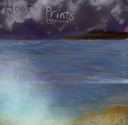
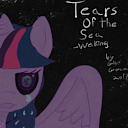
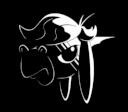

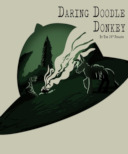

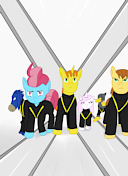

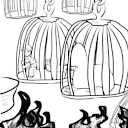


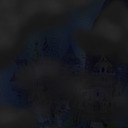


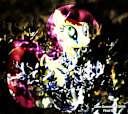
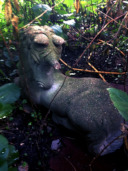
I'm really regretting not finishing this story earlier. I'm really intrigued by the whole left-handed trope in Celtic lore. Normally, I've always seeen it as something evil, but was that what you were going for here?
I really enjoyed the spiral Cranky went down , in a horrific way. This story is criminally underrated.
Also, there are some typos in the later chapters. Chapter 3 should have "intimate" instead of intimidate, for example.
9057381
The left hand is a marked contract thing. The moment Cranky made the deal a mark showed on his left hoof. If the Puca hadn’t taken a liking to him, he would have ended up like the others. I chose the left hoof because the left hand isn’t evil it’s just often related to spiritual or mystical matters. However it’s often associated with bad or evil things, so I also wanted to have it set the mood of the story.
Send me a list and location of the typos if you want, I was really sick when I wrote this so I’m not surprised they are there. I can’t fix them till my iPad screen is repaired though. That might take a week or so. I’ll go through chapter three when I get my device back.
Glen Gorewood